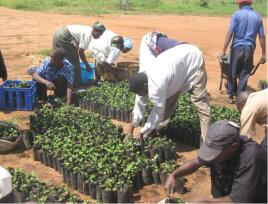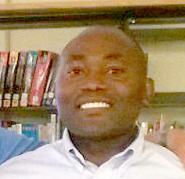Malawi Farm Expert Visits United States
A few weeks ago I had the opportunity to interview Alex Halale, a Project Leader for Farmers' Clubs in Malawi. I am new to Planet Aid's Manager in Training Program, and speaking with Alex offered me the opportunity to hear directly from someone who is on the frontlines of Planet Aid's development work.
Alex was visiting the United States to attend a conference and discuss his work in helping small farmers overcome the impacts of climate change. Since a part of Planet Aid's Manager in Training program involves work in Africa, and since I am interested in sustainable agriculture, I was curious to hear what Alex had to say. I also wanted to know about his life and what it was like for him to visit the United States for the first time.
Alex is the son of a teacher and a nurse. This gave him more opportunities than others in his country to pursue an education. After finishing grade 12, he decided to continue his studies in the area of conservation, with courses in development, disaster relief, and climate change.
"If we are willing to share and work together then we can overcome anything, including climate change."
—Alex Halale
His interest in conservation eventually led him to Development Aid from People to People (DAPP), a local development agency in Malawi. Alex began working with DAPP's Farmers' Clubs Program in 2006, and has continued to do so to the present time.
In listening to him describe his work, what struck me most was how Farmers' Clubs facilitated the adoption of conservation practices by 80% of farmers who participated in the program. Most of these former subsistence-level farmers now produce a surplus that can be sold. Alex shared an example of a woman named Janet who, through the program, saw her annual income increase from $70 a year to $1,810 a year, a stunning difference.
In addition to hearing about this great work, what I found particularly interesting was Alex's view of Americans. He had thought the United States was a homogenous society before arriving here; he didn't expect to find the diversity of accents and cultures, or even see another black person. I was both amused by this idea, and a bit surprised that perhaps American culture promoted overseas tends to portray us as a thoroughly white society.
Conversely, Alex discovered that Americans tend to view Africa as the land of lions and tigers, HIV/AIDS, and extreme poverty. That it is a continent stuck in the last century, and not actively trying to improve its situation. I agreed with his assessment. Perhaps this is because people, unfortunately, often fail to read more than the news headlines or watch only snippets on TV.
 Despite what people see in the news, Africa is a continent working towards the future. As Alex pointed out, while literacy may be low, Africans have a vast knowledge about the Earth, and can see the changes wrought by climate change just by looking at the world around them, and are working, already, to deal with the effects.
Despite what people see in the news, Africa is a continent working towards the future. As Alex pointed out, while literacy may be low, Africans have a vast knowledge about the Earth, and can see the changes wrought by climate change just by looking at the world around them, and are working, already, to deal with the effects.
Because of what he knew of America's misperception about Africa, Alex felt some trepidation about sharing his ideas and thoughts about his work. Moreover, with the United States as the land of big agriculture, he had wondered: would his ideas on the necessity of building capacity and sustainability of small-scale farmers in Africa reach anyone?
What he found was that people were very interested in what he was doing. People wanted to know about small-scale farming and creating sustainable agriculture, and that people here were doing the same sort of things for themselves. People are working towards a common goal, albeit in many different ways, but open to new ideas and willing to share. Just like the Farmers' Clubs where people learn together and share ideas to improve their farms, the same thing is happening in the United States. "And maybe," Alex said to me, "If we are willing to share and work together then we can overcome anything, including climate change."

